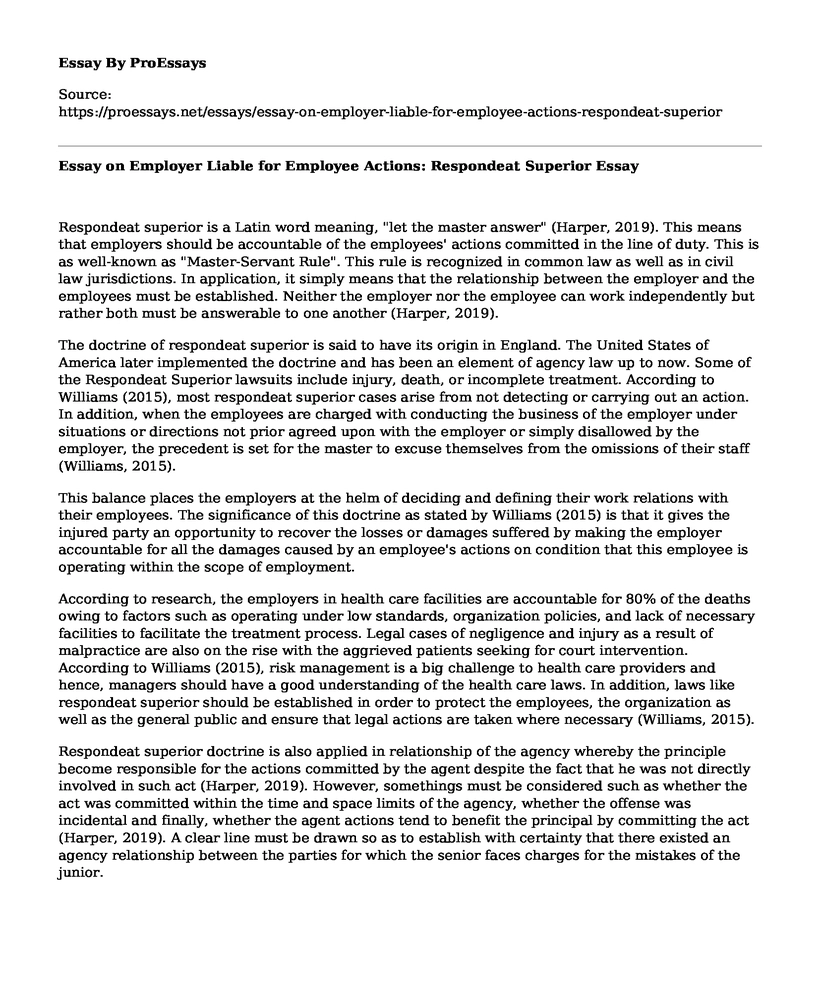Respondeat superior is a Latin word meaning, "let the master answer" (Harper, 2019). This means that employers should be accountable of the employees' actions committed in the line of duty. This is as well-known as "Master-Servant Rule". This rule is recognized in common law as well as in civil law jurisdictions. In application, it simply means that the relationship between the employer and the employees must be established. Neither the employer nor the employee can work independently but rather both must be answerable to one another (Harper, 2019).
The doctrine of respondeat superior is said to have its origin in England. The United States of America later implemented the doctrine and has been an element of agency law up to now. Some of the Respondeat Superior lawsuits include injury, death, or incomplete treatment. According to Williams (2015), most respondeat superior cases arise from not detecting or carrying out an action. In addition, when the employees are charged with conducting the business of the employer under situations or directions not prior agreed upon with the employer or simply disallowed by the employer, the precedent is set for the master to excuse themselves from the omissions of their staff (Williams, 2015).
This balance places the employers at the helm of deciding and defining their work relations with their employees. The significance of this doctrine as stated by Williams (2015) is that it gives the injured party an opportunity to recover the losses or damages suffered by making the employer accountable for all the damages caused by an employee's actions on condition that this employee is operating within the scope of employment.
According to research, the employers in health care facilities are accountable for 80% of the deaths owing to factors such as operating under low standards, organization policies, and lack of necessary facilities to facilitate the treatment process. Legal cases of negligence and injury as a result of malpractice are also on the rise with the aggrieved patients seeking for court intervention. According to Williams (2015), risk management is a big challenge to health care providers and hence, managers should have a good understanding of the health care laws. In addition, laws like respondeat superior should be established in order to protect the employees, the organization as well as the general public and ensure that legal actions are taken where necessary (Williams, 2015).
Respondeat superior doctrine is also applied in relationship of the agency whereby the principle become responsible for the actions committed by the agent despite the fact that he was not directly involved in such act (Harper, 2019). However, somethings must be considered such as whether the act was committed within the time and space limits of the agency, whether the offense was incidental and finally, whether the agent actions tend to benefit the principal by committing the act (Harper, 2019). A clear line must be drawn so as to establish with certainty that there existed an agency relationship between the parties for which the senior faces charges for the mistakes of the junior.
Conclusion
In conclusion, respondeat superior can successfully be implemented in institutions where the employers have full control over the employees' actions. However, there must be a prove that the cause of injury was controllable within the employer's professional scope. Respondeat superior encourages responsibility in both personal and professional spheres. This is because it makes individuals realize that someone has to take responsibility for actions. The rationale beyond holding the employers liable is because they should have the right and authority to guide and control their staffs' actions hence preventing malpractices that may lead to unnecessary loss of life.
References
Harper, M. C. (2019). Using the Anglo-American Respondeat Superior Principle to Assign Responsibility for Worker Statutory Benefits and Protections. Wash. U. Global Stud. L. Rev., 18, 161. https://openscholarship.wustl.edu/cgi/viewcontent.cgi?article=1671&context=law_globalstudies
Williams, R. (2015). Agency-Respondeat Superior-Master's Liability to Third Persons Injured as a Result of Accepting an Unauthorized Invitation from the Servant. DePaul Law Review, 15(2), 462. http://via.library.depaul.edu/cgi/viewcontent.cgi?article=3271&context=law-review
Cite this page
Essay on Employer Liable for Employee Actions: Respondeat Superior. (2023, Mar 02). Retrieved from https://proessays.net/essays/essay-on-employer-liable-for-employee-actions-respondeat-superior
If you are the original author of this essay and no longer wish to have it published on the ProEssays website, please click below to request its removal:
- Research Paper on Multivariate Garch Models
- Role of NIOSH in Establishing Safety and Health Training Criteria and Programs
- Economics of International Trade Essay Example
- Essay Example on Pro Sports: Big Money, Big Opportunities
- Essay on My Journey to Becoming a Psychiatric Technician & Neuropsychologist
- Difficult Conversations: Resolving Conflicts & Harassment in the Workplace - Essay Sample
- Essay Example on Uniting Diverse Cultures: Integrating Cultural Diversity in HRM







